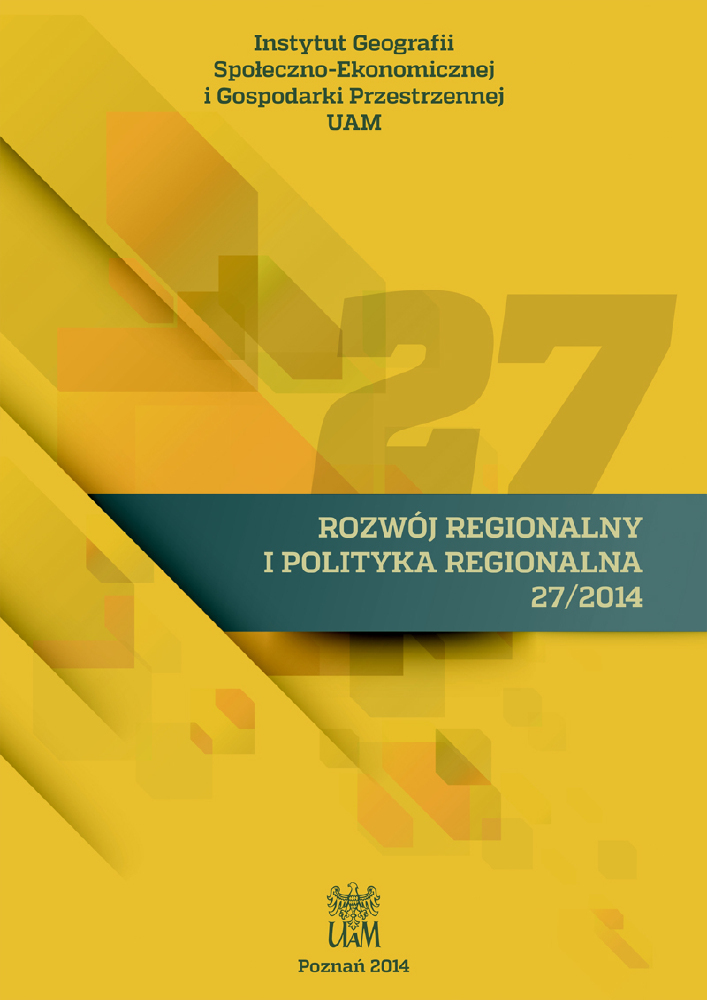Abstract
Accession to the European Union in 2004 was undoubtedly one of the main drivers of change in science and higher education in Poland in recent years. This applies in particular to the international aspects of higher education and research institutions. Infrastructural benefits, in the form of EU funding for the construction and modernization of university buildings, laboratory equipment, etc., seem equally important.This paper attempts to identify and assess the impact of EU membership on the situation and internationalization of science and higher education in Poznan. To this end, the paper includes analyses of four dimensions of scientific and educational activity: (1) international publishing activity – publications in the most prestigious journals, (2) international scientific cooperation under the European Union Framework Programmes (3) projects implemented by scientific institutions and universities under operational programs, and (4) internationalization of education process at universities. For comparison purposes, the state of science and higher education in Poznan has been compared to the situation in other major Polish cities. The study conducted showed that for each of the spheres analysed the benefits can be identified of EU membership for science and higher education in Poznan.
References
Acosta M., Coronado D., Ferrándiz E., León, M.D. 2010. Factors affecting inter-regional academic scientific collaboration within Europe: the role of economic distance. Scientometrics, 87, 1: 63–74. DOI: https://doi.org/10.1007/s11192-010-0305-6
Altbach P.G., Knight J. 2007. The internationalization of higher education: Motivations and realities. Journal of Studies in International Education, 11, 3–4: 290–305. DOI: https://doi.org/10.1177/1028315307303542
Apple M.W., Ball S.J., Gandin L.A. (red.). 2010. The Routledge International Handbook of Sociology of Education. Routledge, Abingdon. DOI: https://doi.org/10.4324/9780203863701
Bajerski A. 2009. Przekształcenia struktury przestrzennej szkolnictwa wyższego w Polsce po 1989 r. Bogucki Wydawnictwo Naukowe, Poznań.
Bajerski A. 2011. Konkurencyjność Poznania jako ośrodka nauki w Polsce i Europie. Centrum Badań Metropolitalnych UAM, Poznań.
Bajerski A. 2012. Ranga Poznania jako ośrodka nauki. [w:] T. Kaczmarek (red.), Pozycja konkurencyjna Poznania wśród metropolii polskich i europejskich, s. 181–199.
Bessey D. 2012. International student migration to Germany. Empirical Economics, 42, 1: 345–361. DOI: https://doi.org/10.1007/s00181-010-0417-0
Biostat 2013. Efektywność wdrażania strategii promocji marki Poznań (raport).
Chojnicki Z., Czyż T. 1997. Struktura przestrzenna nauki w Polsce. Bogucki Wydawnictwo Naukowe, Poznań.
de Wit H. 2002. Internationalization of Higher Education in the United States of America and Europe: A Historical, Comparative, and Conceptual Analysis. Westport, London.
Gómez I., Fernández M.T., Sebastián J. 1999. Analysis of the structure of international scientific cooperation networks through bibliometric indicators. Scientometrics, 44, 3: 441–457. DOI: https://doi.org/10.1007/BF02458489
González C.R., Mesanza R.B., Mariel P. 2011. The determinants of international student mobility flows: an empirical study on the Erasmus programme. Higher Education, 62, 4: 413–430 DOI: https://doi.org/10.1007/s10734-010-9396-5
Malendowski E. 2012. Główne tendencje w handlu zagranicznym nowych państw członkowskich (UE-10) wynikające z akcesji do UE. [W:] J. Rymarczyk, M. Domiter, W. Michalczyk (red.), Handel i inwestycje w semiglobalnym otoczeniu. T. 2. Prace
Naukowe Uniwersytetu Ekonomicznego we Wrocławiu, 267, 2: 106–121.
Matthiessen C.W., Schwarz A.W., Find S. 2006. World cities of knowledge: research strength, networks and nodality. Journal of Knowledge Management, 10, 5: 14–25 DOI: https://doi.org/10.1108/13673270610691143
Najda-Janoszka M., Wach K. 2010. Międzynarodowe powiązania kooperacyjne małopolskich przedsiębiorstw w procesie europejskiej integracji gospodarczej. Zeszyty Naukowe Uniwersytetu Ekonomicznego w Krakowie, 812: 99–114.
Olechnicka A., Płoszaj A. 2008. Polska nauka w sieci? Przestrzeń nauki i innowacyjności. Raport z badań. Ministerstwo Rozwoju Regionalnego, Warszawa.
Ortega J.L., Aguillo I.F. 2010. Shaping the European research collaboration in the 6th Framework Programme health thematic area through network analysis. Scientometrics, 85: 377–386 DOI: https://doi.org/10.1007/s11192-010-0218-4
Pijet-Migoń E. 2012. Zmiany rynku lotniczych przewozów pasażerskich w Polsce po akcesji do Unii Europejskiej. Rozprawy Naukowe Instytutu Geografii i Rozwoju Regionalnego Uniwersytetu Wrocławskiego, 25.
Słowiński R. 2011. Poznań jako ośrodek naukowy – pozycja w kraju i w Europie. Nauka, 4: 109–124.
Supel J.A. 2007. Udział Polski w 6. Programie Ramowym Wspólnoty Europejskiej w dziedzinie badań, rozwoju technologicznego i wdrożeń przyczyniających się do tworzenia Europejskiej Przestrzeni Badawczej i innowacji (2003–2006). Statystyki.
Raport końcowy. Krajowy Punkt Kontaktowy Programów Badawczych UE, Warszawa.
Teichler U. 2004. The changing debate on internationalisation of higher education. Higher Education, 48, 1: 5–26. DOI: https://doi.org/10.1023/B:HIGH.0000033771.69078.41
Wagner C.S., Leydesdorff L. 2005. Mapping the network of global science: comparing international co-authorships from 1990 to 2000. International Journal of Technology and Globalisation, 1, 2: 185–208. DOI: https://doi.org/10.1504/IJTG.2005.007050
License
Copyright
© 2014 IGSEiGP, Uniwersytet im. Adama Mickiewicza w Poznaniu
OPEN ACCESS
